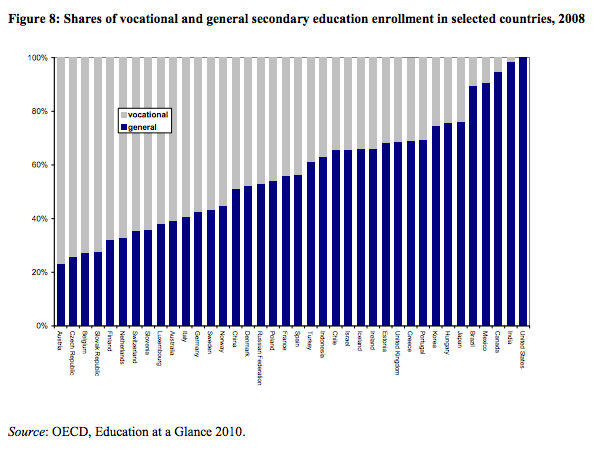Can vocational learning tackle youth unemployment?
"Europe is now making a break between lower secondary at 14 and upper secondary [...] The country that has got the lowest level of young unemployment is Austria. [...] Austria stops the National Curriculum at 14, and there is a direct correlation between vocational practical learning and lower youth unemployment."
Lord Baker on Sky News, 21 January, 2013
"Youth unemployment is far lower in countries such as Germany and Holland — where high-quality practical training is widely available to teenagers."
The Sun, 21 January, 2013
According to a report published today by Policy Exchange, British students are being held back and bogged down by a lack of high-caliber vocational courses and alternatives to traditional academic subjects in school. Forced to study subjects which do not reflect their preferences nor the needs of the job market, a great number of students are leaving school unprepared for the job market. Policy Exchange are now suggesting that given the evidence, "greater employer involvement" in schools could mean an end to the 31% drop out rate of students undertaking A levels. The report also puts the spotlight on the high quality of vocational education on offer in other countries, notably the Netherlands and Germany where youth unemployment rates are much lower than in Britain. But are things as straightforward as they are being presented? Could vocational courses solve the bane of youth unemployment? Let's take look at the facts behind this study. "31% of young people who do A-levels drop out of their studies"This claim is based on a research paper published by the University of London Institute of Education last year. The paper detailed the progression of 2,400 14 and 16-year-olds over three years, in a consortium of six 11-18 schools, as well as a large further education college in southern England.
What's interesting however, given the conclusions reached by the Policy Exchange report, is that according to the paper, the participating college offered "a wide range of vocational programmes, but the majority of learners did not want to take these courses."
"Youth unemployment is far lower in countries such as Germany and Holland" - is this true?True. According to Eurostat Europe indicators for the year 2011, youth unemployment stood at 21% in the UK, 9.4% in the Netherlands and only 8.1% in Germany.
Is youth unemployment in Germany and the Netherlands lower because of their vocational education?
The correlation/causation element of this is a more complex matter. However, it's a view also held by the World Bank in a 2013 report that vocational courses have a positive impact on NEET rates and youth unemployement:
"In cross-country comparisons it is generally found that countries maintaining a substantial dual apprenticeship system, i.e. Austria, Denmark, Germany and Switzerland, exhibit a much smoother transition from school to work, low NEET rates, low youth unemployment and below average repeated unemployment spells than other countries."

There are, nevertheless, examples that 'break the rule'. Italy's level playing field is tilted in favour of vocational courses, for instance, yet youth unemployment reached 29.1% in 2011, according to Eurostat.
Overall, it appears the case for the implementation of vocational courses in British schools is built on strong evidence. However, it is difficult to assess to what extent vocational courses would be able to mitigate the clear impact the economic trouble is having on youth unemployment in Europe.
To add to this point, it is also unclear up to what point the growth of youth unemployment in the UK has been caused by the lack of strong vocational courses and employer involvement in schools, as opposed to four years of economic downturn.
---
Flickr image courtesy of Marion Doss